Graham Reid | | 3 min read
BB King: Blues at Midnight (1962)
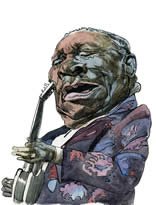
B.B. King (born Riley King on a
plantation in Itta Bena, Mississippi in 1925) has arguably been the
blues' greatest populariser, so his track record includes
performances with the Duke Ellington Orchestra, Stevie Wonder and the
Memphis Horns, Joe Walsh, the Crusaders, Gary Moore and, of course,
U2 and Eric Clapton.
That kaleidoscope of other talents on
hand plus King's breadth of stylistic excellence - from Memphis blues
with Phineas Newborn Jr on piano for his 1949 debut Miss Martha King,
through to the Elmore James slide style on Please Love Me from '52,
to the pop ballad Don't Get Around Much Anymore -- made his handsome
box set King of the Blues, 1949-91 less a chore or worthy document than a
potted history of a man whose career seldom faltered.
King took the blues from out of the
South around the planet more times than anyone could care to recall.
Even in the early Nineties when the
collection appeared King was playing almost 300 gigs a year and
cannily tailoring his material to the youthful demands of the U2
crowd, stretching out his distinctive guitar lines for jazz/blues
festivals and toughening up when playing for predominantly black
audiences.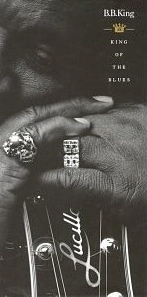
For almost 65 years B. B. King and his
guitar Lucille have captured the imagination.
Scrupulously polite but often
impenetrable as an interview subject -- all of those he has worked
with are “fine young men" (U2) or “a fine gentleman"
(Gary Moore) -- King has been populist but uncompromised as a blues
guitarist and singer.
Ironically, he was originally known as
a guitarist and in fact, if you listen to the chronological sequence
of King of the Blues, it isn't until the sixth track, Everyday I Have
the Blues from '55, that the truly distinctive, lazy King vocal style
kicks in.
His career stumbled only a couple of
times, notably when he signed to ABC-Paramount in the early Sixties
when they put him in a blues balladeer context clearly aimed at
mainstream acceptance. No bad thing, but the Mr Blues album came with
cover notes which suggested eerily that “it's entirely possible
that with the release of this album B. B. King will show up as a
guest on The Ed Sullivan Show, sign to do a David Merrick musical,
appear with the New York Philharmonic as Leonard Bernstein explains
the blues . . . In other words, acceptance.”
Well, it didn’t come that way
thankfully, and ABC -- after the great, spooky Help the Poor with
Latin percussion and no King distinctive guitar part -- recorded the
man in his finest context, at the black theater the Regal.
The resulting album, Live at the Regal of '65 (only one track in the box set, reason enough to get it to accompany
this career overview) was a watershed. He would never be expected to
even modestly compromise again . . . and it came on the cusp of the
British blues boom.
The career that had seldom been less
than extraordinary now went global.
King of the Blues covers all this
ground -- including superb insights such as the unreleased, live
Goin' Down Slow recorded in Chicago in '67 -- and yet . . . that
many years, all those albums, all that music, they still cannot be
encompassed here.
Seventy-seven tracks spread over four
CDS -- many of them previously unreleased and a dozen or more
rarities scattered through -- might seem rather too much B. B. King
for most tastes.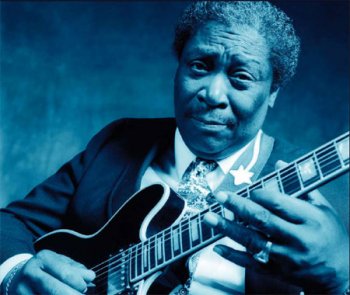
But longtime King followers wil bemoan
the paucity of material from Live at the Regal, the Lucille album
from '68 and, yes, maybe Thank You For Lovin' The Blues would have
slotted in neatly at the end of the third disc right after the two
great tracks To Know You Is To Love You and I Like to Live the Love
from the same album.
But that is probably being churlish and
picky -- because King of the Blues offers a swag of B.B. -- from his
Memphis-grounded, Chicago-influenced urban blues of the Fifties
through to the unreleased Many Miles Travelled written and produced
by Living Colour's Vernon Reid.
Lotta King, many miles travelled -- and the thrill of hearing B.B. King's powerful voice and distinctive vibrato guitar is never gone.
The distinctive caricature at the head of this article is by the artist Kerry Waghorn. See here.
Like this? Then check out the interviews, reviews and overviews at Blues in Elsewhere.

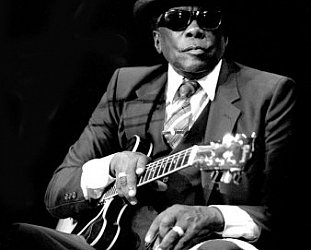
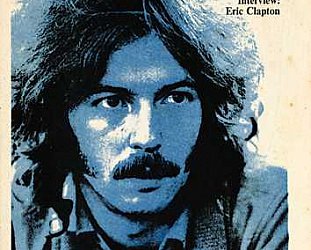
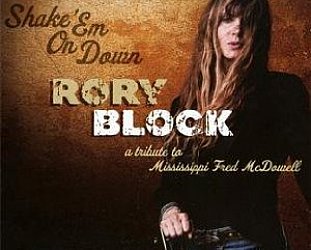

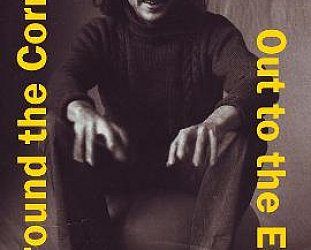

dametra - Apr 19, 2011
awsome
Savepost a comment